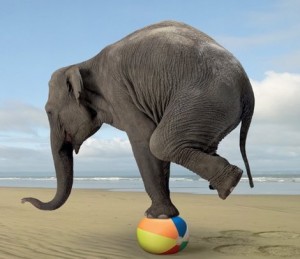Are you a “balanced” rider?
Have you ever gotten left behind or fallen forward when your horse changed gears suddenly or unexpectedly (or expectedly)? Have you ever been told that you are sitting or leaning to one side or the other, or have trouble with uneven stirrup leathers? Gotten “jumped” out of the saddle? Then you have met the Rider’s Best Friend “Balance” – or at least the lack thereof!
What is balance, really? Balance, or “Equilibrioception” is a result of  your brain comparing sensory data from your skeleton and muscles with those of your eyes and inner ear in relation to the gravitational pull of the earth. It processes these data faster than you could possibly be aware, and then sends signals to the muscles, tendons and joints to adapt to changes in speed, angle, elevation, direction, etc. Since our brain is the processing center for all the information as well as the transmission center, it behooves us to ensure that it is as healthy as possible. It is critical that we keep the communication pathways strong and clear, so that our muscles and joints don’t miss those extremely important signals! This is why balance training is so very important for riders.
your brain comparing sensory data from your skeleton and muscles with those of your eyes and inner ear in relation to the gravitational pull of the earth. It processes these data faster than you could possibly be aware, and then sends signals to the muscles, tendons and joints to adapt to changes in speed, angle, elevation, direction, etc. Since our brain is the processing center for all the information as well as the transmission center, it behooves us to ensure that it is as healthy as possible. It is critical that we keep the communication pathways strong and clear, so that our muscles and joints don’t miss those extremely important signals! This is why balance training is so very important for riders.
Why is balance so important, anyway? Well, there are many very good reasons that you may not have thought about, such as:
- Your balance directly affects your horse’s balance. Horses being prey animals have a very keen instinct to keep themselves in balance. Horses that are out of balance are vulnerable to predators, and therefore tend to feel fearful. It is not uncommon to see a horse feel completely secure and confident under a very balanced rider, but get worried, upset, spooky or even dangerous under a very unbalanced rider. People often assume this is because the former rider is also the more skilled rider, but it has much more to do with the balance than the rider’s skill. A completely novice rider who has excellent balance will instill much greater confident in the horse than a very skilled rider whose balance is compromised.
- Your brain controls your balance, and if your balance is weak or unstable, it is a clear sign that your brain is not properly communicating with your body, and both need training.
- One out of every three adults age 65 or older falls each year. And 1/5th of those falls result in serious injuries. As we age, and especially if we have had previous injuries, our balance is compromised more and more each year, unless we actively work to counteract that trend. Balance training is critical for overall quality of life, not just riding!
It is equally important to ensure that our inner ears and eyes are healthy. Congestion from a cold or chronic infection can completely upset our brain’s ability to manage our balance appropriately – the brain will process the data, whether it’s right or wrong, and will make incorrect adjustments based on the flawed data. For this reason, if you are an individual who often suffers from vertigo when you are sick, it is safest to stay off your horse during those times. Support your immune system by eating a “clean” diet full of fresh vegetables and fruits and lean sources of protein, avoid allergens which can cause inner ear congestion, and stay well hydrated in order to support a healthy equilibrium!
One final thought on balance. Balance is your body’s position relative to the ground – or the gravitational pull of the earth. Balance on the horse is no different than balance on the ground. Many people think that they must stay in balance “with the horse”, but this is a misconception that results in many a rider leaning with their horse, collapsing in their bodies, and further upsetting the horse’s own balance. The rider must “move” with the horse in order to stay in balance, but balance is ALWAYS relative to the ground. If the rider remains in balance with the ground, the horse will have a much easier time of balancing himself, and in fact will learn to “stay with” the rider, as much out of a sense of self preservation as because it is simply easier and more comfortable.
So, train your balance! Appreciate the challenges you experience as you do so, knowing that in this way you are helping your horse, as well as your own body!
‘Till next time, Ride FIT!
Speak Your Mind